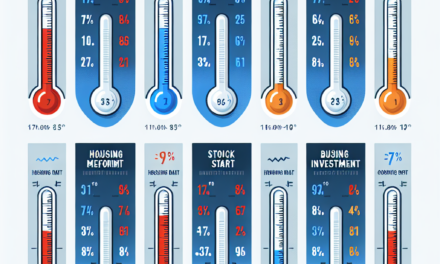“Eagle Materials: A Shift to Neutral as Citi Reassesses Growth Potential.”
Introduction
Eagle Materials Inc., a leading supplier of construction materials, has recently been downgraded to a “Neutral” rating by Citi. This decision reflects concerns over the company’s near-term growth prospects and market conditions affecting the construction sector. Analysts at Citi have cited factors such as fluctuating demand, rising input costs, and potential impacts from economic uncertainties as key reasons for the downgrade. Investors are advised to closely monitor these developments as they may influence Eagle Materials’ performance in the coming quarters.
Eagle Materials: Citi’s Downgrade Explained
Eagle Materials, a prominent player in the construction materials sector, has recently faced a downgrade from Citi, which has shifted its rating from Buy to Neutral. This decision has raised eyebrows among investors and analysts alike, prompting a closer examination of the factors that led to this significant change. Citi’s analysts have cited a combination of market conditions, financial performance, and broader economic indicators as the basis for their revised outlook on the company.
To begin with, the construction materials industry has been experiencing a period of volatility, influenced by fluctuating demand and supply chain disruptions. As the economy grapples with inflationary pressures and rising interest rates, the construction sector has shown signs of slowing down. This deceleration in construction activity has a direct impact on companies like Eagle Materials, which rely heavily on consistent demand for their products. Consequently, Citi’s analysts have expressed concerns about the sustainability of Eagle’s growth trajectory in the current economic climate.
Moreover, Eagle Materials has reported mixed financial results in recent quarters, which have further contributed to Citi’s decision to downgrade the stock. While the company has demonstrated resilience in certain areas, such as its cement and wallboard segments, other divisions have struggled to maintain profitability. This inconsistency in performance raises questions about the company’s ability to navigate the challenges posed by a shifting market landscape. As a result, Citi’s analysts have opted for a more cautious stance, reflecting their apprehension regarding Eagle’s future earnings potential.
In addition to these internal factors, external economic conditions have also played a pivotal role in Citi’s downgrade. The ongoing geopolitical tensions and supply chain disruptions have created an unpredictable environment for construction materials companies. These challenges have not only affected the cost of raw materials but have also led to delays in project timelines, further exacerbating the uncertainty surrounding the industry. As such, Citi’s analysts have deemed it prudent to adopt a Neutral rating, suggesting that investors should exercise caution when considering Eagle Materials as a long-term investment.
Furthermore, the competitive landscape within the construction materials sector cannot be overlooked. Eagle Materials faces competition from both established players and emerging companies that are vying for market share. This competitive pressure can lead to pricing wars and margin compression, which may hinder Eagle’s ability to maintain its profitability. Citi’s downgrade reflects an acknowledgment of these competitive dynamics, as the firm seeks to provide investors with a realistic assessment of the risks associated with investing in Eagle Materials.
In conclusion, Citi’s downgrade of Eagle Materials to Neutral is a reflection of a confluence of factors, including market volatility, mixed financial performance, external economic challenges, and competitive pressures. As the construction materials industry continues to navigate a complex landscape, investors are advised to remain vigilant and consider the implications of these developments on Eagle’s future prospects. While the company has demonstrated resilience in the past, the current environment necessitates a more cautious approach. Ultimately, Citi’s decision serves as a reminder of the importance of thorough analysis and prudent decision-making in the ever-evolving world of investment.
Impact of Citi’s Neutral Rating on Eagle Materials
Eagle Materials, a prominent player in the construction materials sector, has recently faced a significant shift in its market perception following Citi’s downgrade to a neutral rating. This decision by Citi, a leading global financial services company, reflects a cautious outlook on the company’s future performance, which could have far-reaching implications for both investors and the broader market. The downgrade is particularly noteworthy given the current economic climate, characterized by fluctuating demand in the construction industry and rising material costs.
Citi’s neutral rating suggests that the firm believes Eagle Materials may not outperform its peers in the near term. This assessment is based on various factors, including the company’s recent financial performance, market conditions, and competitive landscape. Investors often rely on ratings from established financial institutions to guide their investment decisions, and a downgrade can lead to a reevaluation of a stock’s potential. Consequently, this shift in rating may prompt some investors to reconsider their positions in Eagle Materials, potentially leading to increased volatility in its stock price.
Moreover, the downgrade could impact Eagle Materials’ ability to attract new investments. Institutional investors, who often have strict criteria for portfolio inclusion, may be less inclined to invest in a company that has received a neutral rating. This could result in reduced demand for Eagle Materials’ shares, further exerting downward pressure on its stock price. Additionally, the downgrade may signal to the market that there are underlying issues within the company that need to be addressed, which could lead to increased scrutiny from analysts and investors alike.
In light of Citi’s assessment, it is essential to consider the broader implications for Eagle Materials’ operational strategy. The company may need to adopt a more cautious approach to its growth initiatives, focusing on cost management and efficiency improvements rather than aggressive expansion. This shift in strategy could help stabilize the company’s financial performance in the face of uncertain market conditions. Furthermore, by prioritizing operational excellence, Eagle Materials may be able to enhance its competitive position, ultimately leading to a more favorable outlook in the long run.
Additionally, the downgrade may prompt Eagle Materials to engage more actively with its stakeholders, including investors, customers, and employees. Transparent communication regarding the company’s strategic direction and efforts to address any identified challenges will be crucial in maintaining stakeholder confidence. By fostering a culture of openness and accountability, Eagle Materials can work to mitigate the negative effects of the downgrade and reinforce its commitment to delivering value.
In conclusion, Citi’s neutral rating on Eagle Materials serves as a critical reminder of the dynamic nature of the construction materials market and the importance of adaptability in navigating challenges. While the downgrade may initially lead to increased volatility and investor caution, it also presents an opportunity for the company to reassess its strategies and strengthen its operational foundations. By focusing on efficiency and transparent communication, Eagle Materials can position itself to weather the current economic uncertainties and emerge as a resilient player in the industry. Ultimately, the impact of Citi’s neutral rating will depend on how effectively the company responds to this assessment and leverages it as a catalyst for positive change.
Analyzing Eagle Materials’ Financial Performance Post-Downgrade
Eagle Materials, a prominent player in the construction materials sector, has recently faced a downgrade to a neutral rating by Citi, prompting a closer examination of its financial performance in the wake of this decision. This downgrade reflects a broader market sentiment and specific concerns regarding the company’s operational metrics and future growth prospects. As investors and analysts alike seek to understand the implications of this rating change, it is essential to delve into the financial indicators that characterize Eagle Materials’ current standing.
To begin with, the company’s revenue growth has been a focal point of scrutiny. In recent quarters, Eagle Materials has reported fluctuations in its revenue streams, primarily driven by varying demand in the construction sector. While the company has historically benefited from robust infrastructure spending and residential construction activity, recent economic headwinds have raised questions about the sustainability of this growth. Analysts have noted that the slowdown in housing starts and increased interest rates could dampen demand for construction materials, thereby impacting Eagle Materials’ top-line performance.
Moreover, profitability metrics have also come under the microscope. The company’s operating margins have shown signs of compression, attributed to rising raw material costs and supply chain disruptions. These factors have not only affected the cost structure but have also led to increased operational challenges. As a result, Eagle Materials has had to navigate a complex landscape where maintaining profitability becomes increasingly difficult. The downgrade to neutral by Citi may reflect concerns that the company could struggle to pass on these costs to customers, thereby eroding margins further.
In addition to revenue and profitability, cash flow generation is another critical aspect of Eagle Materials’ financial health. The company has historically maintained a strong cash flow position, which has allowed it to invest in growth initiatives and return capital to shareholders. However, the recent downgrade raises questions about the sustainability of this cash flow, particularly in light of potential declines in revenue. Investors are keenly aware that a robust cash flow is essential for funding capital expenditures and supporting dividend payments, making it a vital area of focus in the post-downgrade analysis.
Furthermore, the company’s balance sheet strength is an important consideration. Eagle Materials has maintained a relatively conservative leverage profile, which has provided it with some cushion against economic downturns. However, as the construction market faces uncertainties, the ability to manage debt levels while pursuing growth opportunities will be crucial. The downgrade may signal a need for the company to reassess its capital allocation strategy, ensuring that it remains agile in a shifting market environment.
In conclusion, the downgrade of Eagle Materials to a neutral rating by Citi serves as a catalyst for a deeper analysis of the company’s financial performance. While the company has demonstrated resilience in the past, current market dynamics present challenges that could impact its revenue growth, profitability, cash flow generation, and overall financial stability. As stakeholders evaluate the implications of this downgrade, it becomes increasingly important to monitor how Eagle Materials adapts to these challenges and positions itself for future success in a competitive landscape. The coming quarters will be pivotal in determining whether the company can navigate these headwinds effectively and restore investor confidence.
Market Reactions to Eagle Materials’ Downgrade by Citi
Eagle Materials, a prominent player in the construction materials sector, recently faced a downgrade from Citi, which has shifted its rating from “Buy” to “Neutral.” This decision has sparked considerable discussion among investors and market analysts, as it reflects broader concerns regarding the company’s future performance and the overall health of the construction industry. The downgrade is particularly significant given the current economic climate, characterized by fluctuating demand for construction materials and rising costs associated with raw materials and labor.
In the wake of Citi’s announcement, Eagle Materials experienced immediate market reactions, with its stock price reflecting investor sentiment. The downgrade prompted a wave of selling, as many investors reassessed their positions in light of the new rating. This reaction underscores the sensitivity of the stock market to analyst ratings, particularly in sectors that are heavily influenced by macroeconomic factors. As investors digested the implications of the downgrade, it became evident that concerns about Eagle Materials’ growth prospects were at the forefront of their minds.
Moreover, the construction materials industry is currently navigating a complex landscape. Factors such as supply chain disruptions, inflationary pressures, and changing consumer preferences have all contributed to a more cautious outlook. In this context, Citi’s downgrade serves as a reminder of the challenges that companies like Eagle Materials face. The firm has historically benefited from robust demand in the housing and infrastructure sectors, but recent trends suggest a potential slowdown. As interest rates rise and housing affordability becomes a pressing issue, the demand for construction materials may wane, leading to further scrutiny of companies in this space.
Transitioning from the immediate market reactions, it is essential to consider the broader implications of Citi’s downgrade for Eagle Materials. Analysts are now closely monitoring the company’s financial health and operational efficiency. Investors are particularly interested in how Eagle Materials plans to navigate the current challenges and whether it can maintain its competitive edge. The company’s ability to adapt to changing market conditions will be crucial in determining its long-term viability. Furthermore, the downgrade may prompt Eagle Materials to reassess its strategic initiatives, including potential cost-cutting measures or diversification efforts to mitigate risks associated with its core business.
In addition to the immediate financial implications, the downgrade also raises questions about investor confidence in the construction materials sector as a whole. If other analysts follow suit and issue similar downgrades, it could signal a broader trend of caution among investors. This could lead to a reevaluation of investment strategies within the sector, as market participants seek to identify companies that are better positioned to weather economic uncertainties. Consequently, the ripple effects of Citi’s downgrade may extend beyond Eagle Materials, influencing the stock performance of its peers and the overall market sentiment toward construction-related investments.
In conclusion, the downgrade of Eagle Materials to Neutral by Citi has elicited significant market reactions, reflecting investor concerns about the company’s future amid a challenging economic environment. As the construction materials industry grapples with various headwinds, the implications of this downgrade will likely resonate throughout the sector. Investors and analysts alike will be watching closely to see how Eagle Materials responds to these challenges and whether it can regain the confidence of the market in the months to come.
Future Outlook for Eagle Materials After Citi’s Rating Change
Eagle Materials, a prominent player in the construction materials sector, has recently faced a downgrade to a neutral rating by Citi, a move that has raised eyebrows among investors and analysts alike. This decision reflects a cautious outlook on the company’s future performance, particularly in light of prevailing market conditions and internal operational challenges. As stakeholders assess the implications of this rating change, it is essential to consider the broader context in which Eagle Materials operates and the factors that may influence its trajectory moving forward.
To begin with, the construction materials industry is currently navigating a complex landscape characterized by fluctuating demand, supply chain disruptions, and rising input costs. These challenges have been exacerbated by macroeconomic factors, including inflationary pressures and shifts in consumer behavior. Consequently, companies like Eagle Materials must adapt to these evolving conditions to maintain their competitive edge. Citi’s downgrade suggests that analysts are wary of the company’s ability to effectively manage these challenges in the near term, which could impact its profitability and growth prospects.
Moreover, Eagle Materials has been focusing on expanding its product offerings and enhancing operational efficiencies. While these initiatives are commendable, they require significant investment and time to yield tangible results. The downgrade by Citi may indicate skepticism regarding the pace at which these improvements can be realized, particularly in a market that is increasingly sensitive to economic fluctuations. Investors may be concerned that the company’s strategic initiatives could take longer to materialize than initially anticipated, thereby affecting its short-term performance.
In addition to operational challenges, the competitive landscape within the construction materials sector is intensifying. As new players enter the market and existing competitors ramp up their capabilities, Eagle Materials must not only defend its market share but also innovate to meet changing customer demands. This competitive pressure could further complicate the company’s efforts to achieve sustainable growth. Citi’s neutral rating may reflect an acknowledgment of these competitive dynamics, suggesting that while Eagle Materials has potential, it faces significant hurdles that could hinder its progress.
Furthermore, the outlook for the construction industry as a whole remains uncertain. Factors such as government infrastructure spending, housing market trends, and overall economic growth will play a crucial role in shaping demand for construction materials. While there are signs of recovery in certain segments, the pace and sustainability of this recovery are still in question. As a result, Eagle Materials’ performance will likely be closely tied to these broader industry trends, making it imperative for the company to remain agile and responsive to market shifts.
In conclusion, the downgrade to a neutral rating by Citi serves as a reminder of the complexities and challenges facing Eagle Materials in the current economic environment. While the company has made strides in enhancing its operations and expanding its product lines, the uncertain market conditions and competitive pressures present significant obstacles. As investors and analysts monitor the situation, it will be crucial for Eagle Materials to demonstrate resilience and adaptability in order to navigate these challenges successfully. Ultimately, the company’s ability to execute its strategic initiatives while responding to external pressures will determine its future outlook and potential for growth in the construction materials sector.
Comparing Eagle Materials with Peers Following the Downgrade
Eagle Materials, a prominent player in the construction materials sector, has recently faced a downgrade to a neutral rating by Citi, prompting a closer examination of its position relative to its peers in the industry. This downgrade reflects a broader assessment of the company’s financial health, market dynamics, and competitive landscape. To understand the implications of this rating change, it is essential to compare Eagle Materials with its key competitors, such as Martin Marietta Materials, Vulcan Materials, and HeidelbergCement.
In the wake of the downgrade, it is crucial to analyze the financial metrics that underpin Eagle Materials’ performance. The company has historically demonstrated robust revenue growth and profitability, driven by its diverse product offerings, which include gypsum wallboard, cement, and concrete. However, recent market conditions, including rising raw material costs and fluctuating demand, have put pressure on margins. In contrast, Martin Marietta Materials has maintained a strong financial position, bolstered by its extensive network of operations and strategic acquisitions. This resilience has allowed Martin Marietta to capitalize on infrastructure spending, which has been a significant driver of growth in the construction materials sector.
Moreover, Vulcan Materials, another key competitor, has also shown a solid performance in recent quarters. The company has effectively navigated supply chain challenges and has benefited from its focus on aggregates, which are essential for various construction projects. Vulcan’s ability to adapt to changing market conditions has positioned it favorably against Eagle Materials, particularly in light of the latter’s recent struggles. As a result, investors may view Vulcan as a more stable investment option, especially in an environment characterized by uncertainty.
HeidelbergCement, a global leader in the building materials industry, presents another point of comparison. The company has leveraged its international presence to mitigate risks associated with regional market fluctuations. Its diversified portfolio, which includes cement, aggregates, and ready-mixed concrete, allows HeidelbergCement to maintain a competitive edge. In contrast, Eagle Materials’ reliance on specific product lines may expose it to greater volatility, particularly as demand shifts in response to economic conditions.
Transitioning from financial metrics to market sentiment, it is essential to consider how investor perceptions have shifted following the downgrade. The neutral rating from Citi may signal caution among investors, leading to increased scrutiny of Eagle Materials’ operational strategies and growth prospects. In contrast, peers like Martin Marietta and Vulcan may benefit from a more favorable outlook, as their strong fundamentals and strategic initiatives continue to resonate with market participants. This divergence in investor sentiment could further widen the gap between Eagle Materials and its competitors.
In conclusion, the downgrade of Eagle Materials to a neutral rating by Citi serves as a catalyst for a deeper analysis of the company’s standing within the construction materials sector. By comparing Eagle Materials with its peers, it becomes evident that while the company has historically performed well, recent challenges have raised concerns about its future trajectory. As competitors like Martin Marietta, Vulcan, and HeidelbergCement continue to demonstrate resilience and adaptability, Eagle Materials must navigate a complex landscape to regain investor confidence and enhance its competitive position. Ultimately, the ability to respond effectively to market dynamics will be crucial for Eagle Materials as it seeks to align itself with the strengths exhibited by its industry counterparts.
Investor Strategies for Eagle Materials Amidst Citi’s Neutral Rating
In light of Citi’s recent downgrade of Eagle Materials to a neutral rating, investors are faced with a pivotal moment that necessitates a careful reassessment of their strategies regarding this construction materials company. The downgrade, which reflects a cautious outlook on the stock’s near-term performance, prompts a deeper examination of the factors influencing Eagle Materials and the broader market dynamics at play. As investors navigate this landscape, it is essential to consider both the potential risks and opportunities that may arise in the coming months.
Firstly, understanding the rationale behind Citi’s downgrade is crucial. Analysts often base their ratings on a combination of financial performance, market conditions, and competitive positioning. In the case of Eagle Materials, concerns may stem from fluctuations in demand for construction materials, particularly in light of economic uncertainties. As infrastructure spending and housing markets can be cyclical, investors should remain vigilant about macroeconomic indicators that could impact Eagle’s revenue streams. Monitoring construction activity, interest rates, and government spending initiatives will provide valuable insights into the company’s prospects.
Moreover, it is important for investors to evaluate Eagle Materials’ financial health. A thorough analysis of the company’s balance sheet, cash flow, and profitability metrics can reveal its resilience in challenging market conditions. For instance, a strong cash position may enable Eagle to weather downturns more effectively, while consistent revenue growth could indicate robust demand for its products. By scrutinizing these financial indicators, investors can make informed decisions about whether to hold, buy, or sell their positions in the company.
In addition to financial metrics, investors should also consider the competitive landscape in which Eagle Materials operates. The construction materials industry is characterized by a mix of established players and emerging competitors, each vying for market share. Understanding how Eagle differentiates itself through product quality, pricing strategies, and customer relationships can provide a clearer picture of its long-term viability. Furthermore, assessing the company’s ability to innovate and adapt to changing market demands will be critical in determining its competitive edge.
As investors weigh their options, diversification remains a key strategy. Rather than concentrating solely on Eagle Materials, spreading investments across a range of sectors and asset classes can mitigate risk. This approach allows investors to capitalize on growth opportunities in other industries while maintaining exposure to Eagle’s potential upside. Additionally, considering exchange-traded funds (ETFs) or mutual funds that focus on the construction materials sector may provide a balanced way to invest without overexposing oneself to the risks associated with a single stock.
Furthermore, keeping abreast of industry trends and regulatory changes is essential for making informed investment decisions. For instance, shifts in environmental regulations or advancements in sustainable construction practices could impact demand for traditional materials. By staying informed about these developments, investors can better anticipate how they may affect Eagle Materials and adjust their strategies accordingly.
In conclusion, while Citi’s downgrade of Eagle Materials to a neutral rating may raise concerns among investors, it also presents an opportunity for a strategic reassessment. By analyzing the company’s financial health, understanding the competitive landscape, diversifying investments, and staying informed about industry trends, investors can navigate this uncertain terrain with greater confidence. Ultimately, a well-rounded approach will enable investors to make decisions that align with their long-term financial goals, regardless of the short-term fluctuations in Eagle Materials’ stock performance.
Q&A
1. **Question:** Why was Eagle Materials downgraded to neutral by Citi?
**Answer:** Citi downgraded Eagle Materials due to concerns about potential declines in demand and profitability in the construction materials sector.
2. **Question:** What specific factors influenced Citi’s decision to downgrade Eagle Materials?
**Answer:** Factors included rising raw material costs, potential supply chain disruptions, and a slowdown in construction activity.
3. **Question:** What was the previous rating for Eagle Materials before the downgrade?
**Answer:** The previous rating was “Buy.”
4. **Question:** How did the market react to the downgrade of Eagle Materials?
**Answer:** The market typically reacts negatively to downgrades, often resulting in a decline in stock price.
5. **Question:** What is the new price target set by Citi for Eagle Materials following the downgrade?
**Answer:** Citi set a new price target of $120 for Eagle Materials.
6. **Question:** What are the implications of a “Neutral” rating for investors?
**Answer:** A “Neutral” rating suggests that investors should hold their positions rather than buy or sell, indicating limited upside potential.
7. **Question:** Are there any long-term concerns mentioned by Citi regarding Eagle Materials?
**Answer:** Yes, long-term concerns include the sustainability of demand in the construction sector and potential impacts from economic downturns.
Conclusion
Eagle Materials has been downgraded to a Neutral rating by Citi due to concerns over potential headwinds in the construction materials sector, including rising costs and demand fluctuations. This shift reflects a more cautious outlook on the company’s growth prospects and market conditions, suggesting that investors should approach with caution while monitoring future developments.





